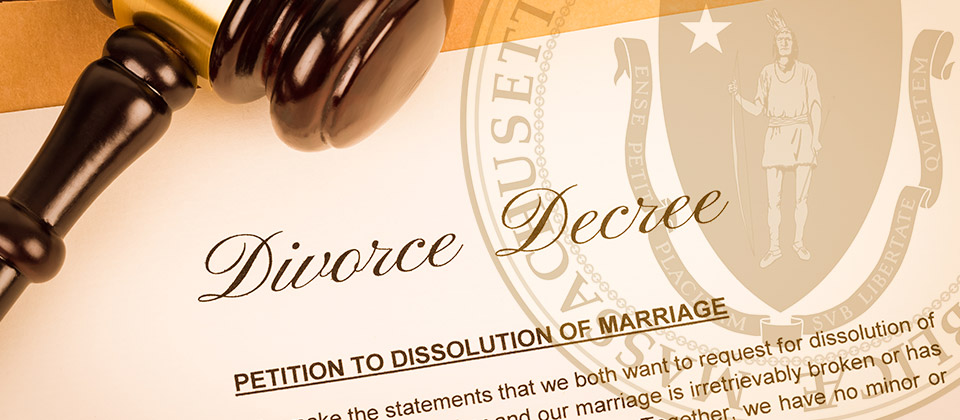Guide to Massachusetts Divorce Records

There are slight differences in how to request divorce records depending on which state you were married in or currently reside in. A single mistake during the application process can delay your request by weeks or longer.
This isn't an amount of time most people have to wait, especially if they need their Massachusetts divorce records for pressing purposes. While you can always visit the county office in person, doing so still requires knowing where to go and what to bring.
What are Massachusetts Divorce Records?
Divorce records are a complete history of the process that ends a marriage. They include any submitted evidence, transcripts, and verdicts. A divorce record exists even if the divorce wasn't sent to court, although the file will be considerably smaller.
The most crucial document in these records is the final judgment, which the judge signs to end the marriage legally. Typically, the final judgment is used to verify a divorce for clerical processes like name changes.
Massachusetts refers to divorce records as the "Certificate of Divorce Absolute", which are maintained solely by the Probate and Family Court of the county that finalized the dissolution. Massachusetts doesn't keep a divorce records database at the State Vital Records Department, unlike other states.

What's Inside the Divorce Record?
Divorce records reflect the complexity of their case. Antagonistic splits are often accompanied by dozens of documents 'proving' one spouse's claim over an asset. Often, the children are also roped in, and multiple documents are drafted to complicate visitation and support. Despite the variability of divorce, most records are broken down into the same five sections, including:
- Final Judgment - This document outlines many of the court's decisions regarding the divorce. It's what legally ends the marriage once signed by the overseeing judge.
- Affidavit - Family Courts require both spouses to summarize their financial positions. The details include financial accounts, life insurance policies, tax particulars, and outstanding debts.
- Spousal Support – Sometimes called "maintenance", these documents define how much one spouse pays the other. These payments support the lower-earning spouse until they become financially independent. The length of the marriage determines the duration of Alimony in Massachusetts.
- Child Custody - Matters related to the primary home, parental rights, and financial assistance are specified in this document. The courts seek to construct a solid foundation for parental duties, focusing on the children's well-being.
- Division of Assets and Debt - Massachusetts divides all assets the divorcing couple owns, not just assets gained during the marriage. The state's laws include gifts and inheritances into divided assets as well.
Errors in Divorce Records
Divorce records have a massive amount of information, and judges use it to make decisions. A misspelled pet name isn't a problem, but misreported financial data can have life-altering consequences.
Rather than intentionally falsifying finances, it's more likely that an asset was forgotten and omitted from the records. These mistakes can cause a judge to misunderstand property division, alimony, and child support disputes.
Rectifying divorce records can be a long and stressful process. Depending on the type of divorce, there's a 90-to-120-day period before the decree becomes absolute. You'll have to repeat many of the steps and arguments from the divorce and prove that an error affected the final ruling.
Divorce Statistics in the State

Massachusetts has the lowest divorce rate in the country, with a reported 1 divorce per 1000 people. This trend isn't new; the state has maintained its low rates for three decades and even cut it in half between 2018 and 2020.
One of the most significant contributing factors to Massachusetts's low divorce rates is its citizens' relatively high marrying age. Psychology Today found that divorce is most likely if the parties marry before 25 years old.
In Massachusetts, men tend first to marry past 30, and women wait until roughly 28. Nationally, these are the average ages that each gender files for their first divorce.
Also, people from the Bay State only remarry 2 percent of the time compared to the 10 percent in states with more divorces. Second and third marriages are significantly more likely to divorce, so a lower remarriage rate helps greatly.
How to Find Massachusetts Divorce Records
Massachusetts doesn't maintain divorce records on the state level, nor does it provide an online ordering platform. The only option to get divorce records is via the Probate and Family Court of the county that finalized the divorce. However, family courts only store records from 1980 to the present.
For records before 1980, you must contact the county's Superior Courts instead.
Luckily, Massachusetts has a standardized and state-wide process for requesting vital records. Any fees, forms, and search requirements remain the same between counties.
All Massachusetts counties accept both walk-in and mail-order requests. Applicants must fill out form PFC 18 and deliver it to the probate courts with $20. This fee can be paid with an attorney's check, money order, bank check, or cashier's check. Some counties may accept cash or credit cards if you visit in person.

Completing form PFC 18 requires you to know the following:
- Name of the county you're requesting from
- Docket Number
- Case Name
- Approximate Filing Date
If you do not have this information, you can search for it through the Massachusetts court case online database. The online records will provide basic information and a timeline of the case.
EXAMPLE:

Massachusetts Probate Court Contact Directory
Government websites have more departments and phone numbers than stars in the sky. Knowing which number to call will keep you from being endlessly transferred between departments. We've compiled a list of phone numbers for the Probate Courts of the top ten most populous Massachusetts counties.
| County | Phone Number |
|---|---|
| Middlesex County | (781) 865-4000 |
| Worcester County | (508) 831-2200 |
| Essex County | (978) 744-1020 |
| Suffolk County | (617) 788-8300 |
| Norfolk County | (781) 830-1200 |
| Bristol County | (508) 977-6040 |
| Plymouth County | (508) 747-6204 |
| Hampden County | (413) 748-7760 |
| Barnstable County | (508) 375-6710 |
| Hampshire County | (413) 586-8500 |
FAQ on Divorce Records in Massachusetts
How long will it take to get my divorce record?
In person, you can expect to get your divorce record the same day unless you're seeking an amendment. Mail orders have an average processing time of 3-5 weeks, but it's recommended to call the courts directly for more accurate details.
Do I need my divorce records to remarry in Massachusetts?
You must have a copy of your divorce decree to apply for a new marriage license. To avoid delays in remarriage, you should request your divorce records immediately, even if you don't have a pressing need.
There are other restrictions on remarriage in Massachusetts. 1A divorces have a NISI (time until you're eligible to remarry) period of 120 days after the final judgment is signed. This waiting period is shortened to 90 days for 1B divorces.
Do I have to pay a fee to get my divorce record in Massachusetts?
Unlike other states, Massachusetts has a standardized fee for vital record requests. A copy of a Certificate of Divorce Absolute is $20 per copy. Acceptable payment methods include the following:
- Money Orders
- Attorney's Checks
- Bank Certified Checks
- Bank Cashier's Checks
All checks must be payable to the Commonwealth of Massachusetts.
Can ANYONE get a copy of my divorce decree?
Anyone can request a certified divorce decree from Massachusetts. Some counties may require the requestor to submit their relation to the divorcees, but it is not listed as a requirement on the State's guidelines.
Can I change the terms of a divorce decree?
Either spouse may appeal the divorce decree for 30 days after the final judgment. If that period passes, they must petition the court with a "Complaint for Modification", demonstrating that their life circumstances have changed since the divorce's terms were set.
